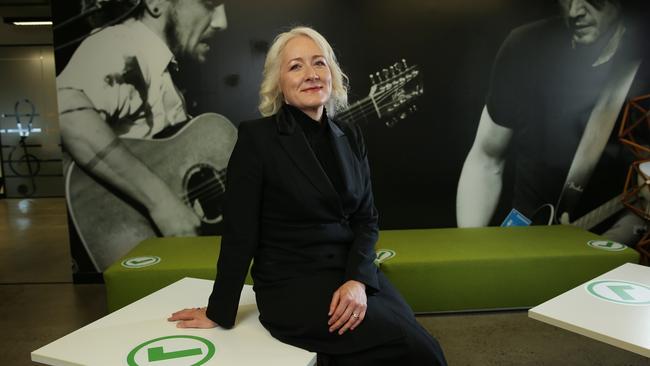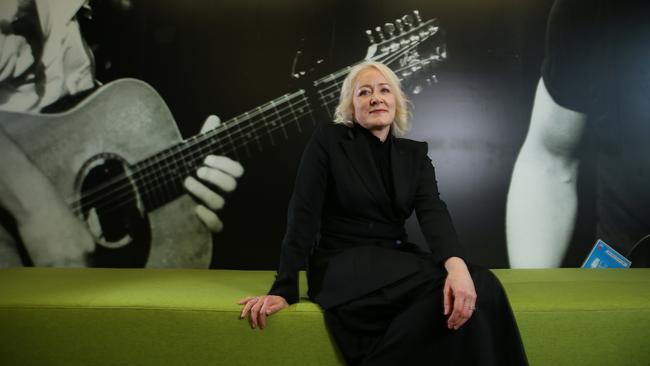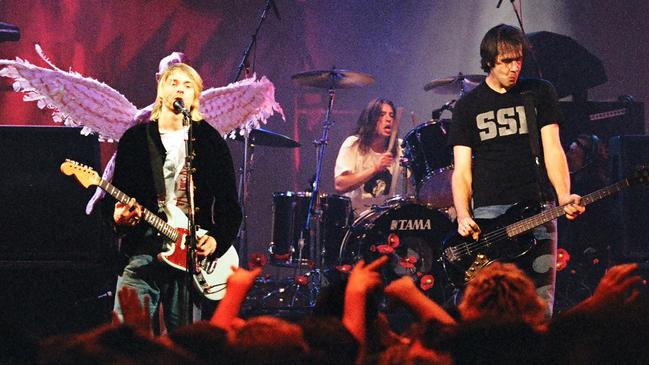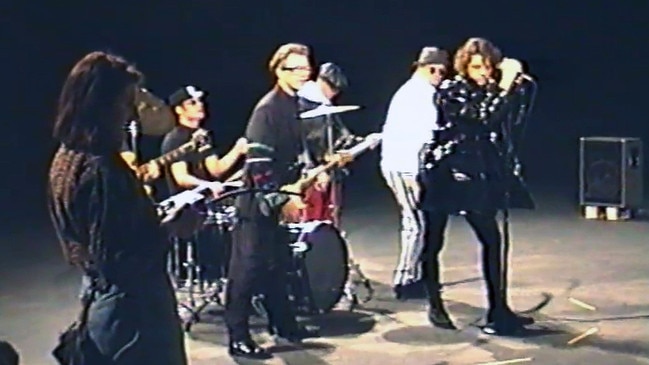When it comes to advocating for Australian music, Annabelle Herd has the loudest voice in the room
Former Network 10 executive Annabelle Herd reveals why she left TV land and now plans to professionalise the music world as ARIA chief executive.

Music is in Annabelle Herd’s blood.
She grew up in a household with two music-loving parents: her English mother playing in a pub and wedding band in East London in the 1960s, while her father – a lover of contemporary music – introduced his two daughters to a range of artists from the Beach Boys to Fleetwood Mac.
The first album she owned was ABBA Arrival on cassette at age seven. By nine her Walkman was her most treasured possession, apart from her rollerskates.
Yet Herd had never worked in the music industry when she was appointed in January 2021 as the chief executive of the Australian Recording Industry Association, better known as ARIA. She was the music peak body’s first female CEO in its history.
“Yes it was a very unexpected appointment, but I want the rest of the economy and the rest of Australia to understand how strong and valuable the music industry is,” says the former Ten Network executive and political adviser.
“I think having come from outside music, I have a perspective that a lot of people who’ve been in music for their entire careers don’t have.”
Herd has spent the past 20 months working to demystify the music industry while taking steps to make it more professional and in doing so, building its case for more support from government.
The problem for benchmarking that support is there is very little data on the make-up of the industry and its skills requirements for the future.
She wants government assistance to be provided to music as it is to other creative industries like the screen sector through Screen Australia, or to the arts through the Australia Council, to build a “deep picture of the music industry, its opportunities and challenges”.
“We have to make our case. That’s how you get government, politicians and the public to support you,” she says.
“We have to show them how important, influential and strong we are. We’ve got so many amazing artists, but new music has never been more challenging to get to an audience.
“When you’ve got 100,000 songs going up to Spotify every day, how on earth do you stand out from that crowd? It is something that we need some strategy and some focus from government to help us look at.
“We’ve got the raw talent, we’ve got the business, how are we going to really capitalise on this incredible opportunity and get our artists the global fame that they deserve?”
In August, Herd also had to confront the distressing findings contained in the Music Industry Review into Sexual Harm, Sexual Harassment and Systemic Discrimination titled, “Raising Their Voices”. The independent review canvassing more than 1600 workers revealed a shocking prevalence of bullying, sexual harm, discrimination, alcohol abuse and unsafe workplaces in the music sector.
On the day the report was released, more than 60 music companies and organisations said “sorry”, acknowledged the harm that had been caused, and committed to change. That has since grown to more than 100.
“It was noted in the report that whilst all of his bad behaviour was happening, there was an incredibly strong will to change,” she says.
“Every organisation has baggage. So navigating that was really, really difficult and navigating the industry side of those things, it is equally hard.
“That’s why an independent report like that hasn’t been done anywhere. But there is an incredibly strong will to make cultural change. A lot has changed, even in the last few years.”
Herd reveals that she herself has been subjected to “comments or uncomfortable situations” throughout her career. Like many women, she’s also been excluded from executive golf days and other male-bonding networking events.
Her response has always been to make her own way.
“I’ve never been one to back down. I put myself forward on my skills and what I can achieve and I think you just show results,” she says. “That’s why you get respect.”
Her ambition for the rest of her ARIA tenure, which is open-ended, is to help more Australian artists become household names.
Most importantly, she wants more to be making a great living out of music.
“Streaming is an incredibly strong growth area and we have an incredibly strong industry that has been globally successful for decades. We have huge Australian artists, both older and younger, smashing it overseas, even now. It is a really strong business,” she says. “I’ve got an amazing platform and I want to give a platform to others who don’t have one. I want to bring voices into the room who don’t have a place. I think that will make the industry better.”
TV land
Herd spent 16 years working at Ten under six chief executives, through its high-profile receivership and the eventual purchase of the network by US giant CBS, which itself was taken over by American conglomerate Viacom.

When she started at Ten in 2004 she initially worked as director of corporate and regulatory affairs before progressing to the role of chief operating officer.
Her experiences taught her plenty about an entertainment businesses going through digital disruption and structural change.
She now reveals for the first time why she left in March 2020, stepping away from the business then owned by ViacomCBS.
“The Viacom-CBS merger had just happened and there was going to be another round of change. I just got to the point where I’d just had enough and thought it was time for something new,” she says.
As COO, she was also set to be charged with undertaking another major restructuring of a workforce exhausted with change.
“You end up sacking people, and then you probably get sacked at the end as well. Realistically, I just thought I don’t want to do that,” she says.
Earlier in her career Herd was a senior adviser to then communications and arts minister Senator Richard Alston. She describes Alston, a former barrister, as “super smart”.
“You had to be across your brief. If you went into his office with a brief, guaranteed he would ask you the question you didn’t know the answer to. It was called the Alston pop quiz; it was famous,” she recalls.
“He was also very progressive and very fair. I worked with so many great people in that office who are all across the media and telecommunications sectors now.”
Herd was born in Cairns and grew up the daughter of an Australian diplomat travelling the world, including stints living in Germany, Venezuela and Sri Lanka.
She remembers the Sri Lankan capital of Colombo in the 1970s being nothing like it is now, without the major tourism resorts but with the poverty too often associated with a developing economy.
She says her time abroad taught her adaptability and gave her curiosity about how people live, to take them at face value and offered her a wider perspective on the world.
But after leaving school, her world was rocked to its core in 1992 – her second year of studying law and Asian Studies at the ANU in Canberra – when her parents divorced.

“Dad met someone in Mexico, it was not happy, it was quite acrimonious,” she says. “I don’t think a divorce is fun for any family and it was very difficult. It is hard to go through that when you are in your early 20s. But my mum powered through. I’m very close to her and my sister, but it made us even closer. We just kept going.”
The power of music
Herd was a huge music fan during her six years at ANU, when she went to many amazing concerts in Canberra at the famed ANU Uni Bar and in Sydney.
She says seeing US grunge band Nirvana at the Uni Bar when she was just 19 was the most iconic live act she has ever seen.
She also saw INXS in 1990 in Rockhampton, where she was a boarder for her final two years of high school while her parents were in Nepal where her father had been posted.
One of the highlights of her ARIA role now is going to regular gigs with her two daughters, aged 14 and 16, who were born and bred in the Sydney suburb of Randwick.
“They do not love dance music, which is a bit heartbreaking for me. But they do love music. I think they tweaked about a year ago about how cool my job was,” she says. “We play a lot of music in the house. Every night at dinner, pretty much somebody will put something on and talk about it. They are obsessed with Taylor Swift.”
Herd says she goes along to music gigs most weeks because she loves live music, but also to enjoy the backstage access to talent offered by her role in the industry.
“It was absolutely one of the biggest appeals of the job to be able to go see music. When you’ve got little kids, it’s much harder to be able to get out of the house to do that,” she says.
“So for me, it’s like a revival of being able to go out to see bands. There’s nothing like seeing them in a small venue or being up front in a huge venue listening to the roar of the crowd.”
Herd has lived for more than a decade now with husband Michael Brealey, who is chief operating officer of Screen Australia.

Curiously, she says she was wary of having children until she met him. “I never really wanted to have kids because I knew that they can be a total career killer. I was like, ‘I’m going to have an amazing career and I want to do all this stuff.’
“So when I met Michael, I realised that he was somebody who wanted to be in 50-50 parenting 100 per cent. Then it became achievable to me to do it.”
They now parent equally and support each other in their careers.
“I think a lot of this for him is he isn’t threatened by my career or my success. I think that’s a bit of a challenge for some men. They don’t like the idea of their partner being more successful than them. It’s somehow challenges their masculinity, which I think is so silly, but it’s a thing,” she says.
“Michael is not like that. But we also have my wonderful mum. She has helped out from day one.”
While Herd hears plenty in society talking of the “mother guilt” of pursuing a full-time career as she has all her working life, she believes she has always put her family first, while working hard.
“So I don’t feel like my girls have suffered in any way from me having a senior role, or Michael having a senior role,” she says.
“I think it is good for them to see us working. They don’t know anything else and it will set them in good stead for when they start their working lives. Even now at school, it shows them that being a woman doesn’t stop you from doing anything.”

